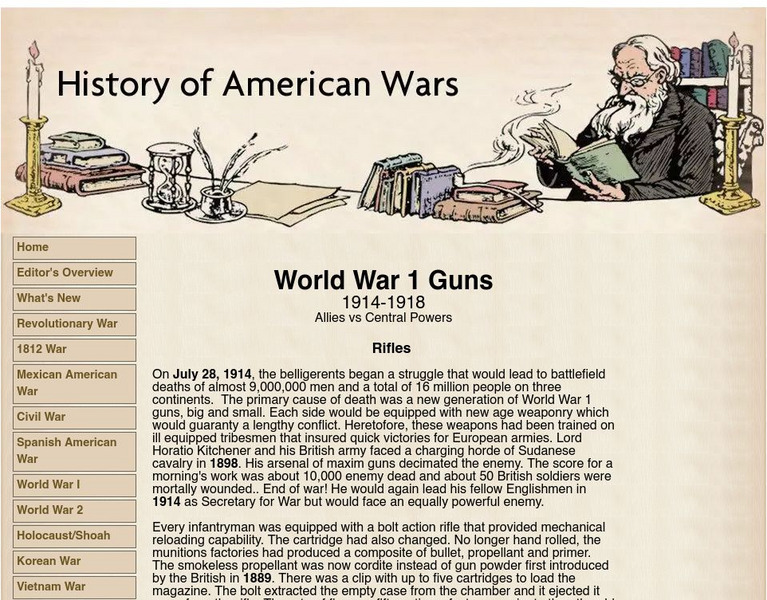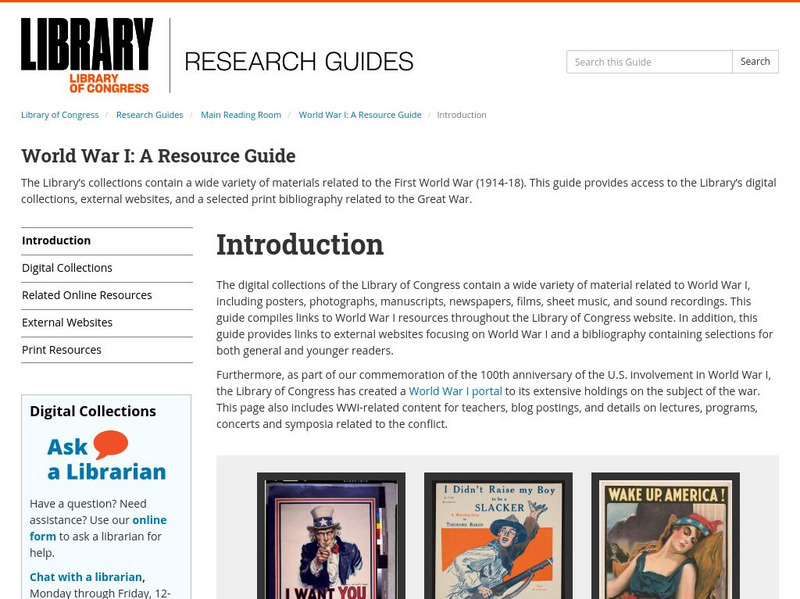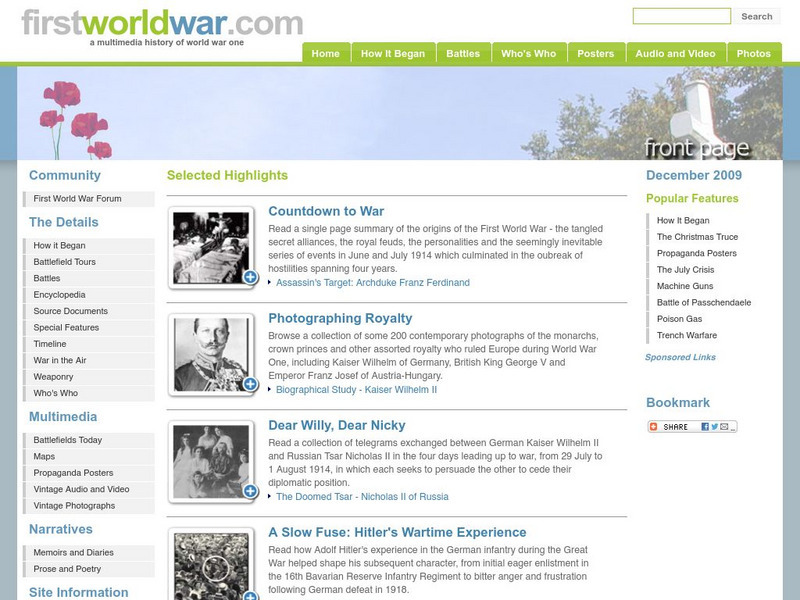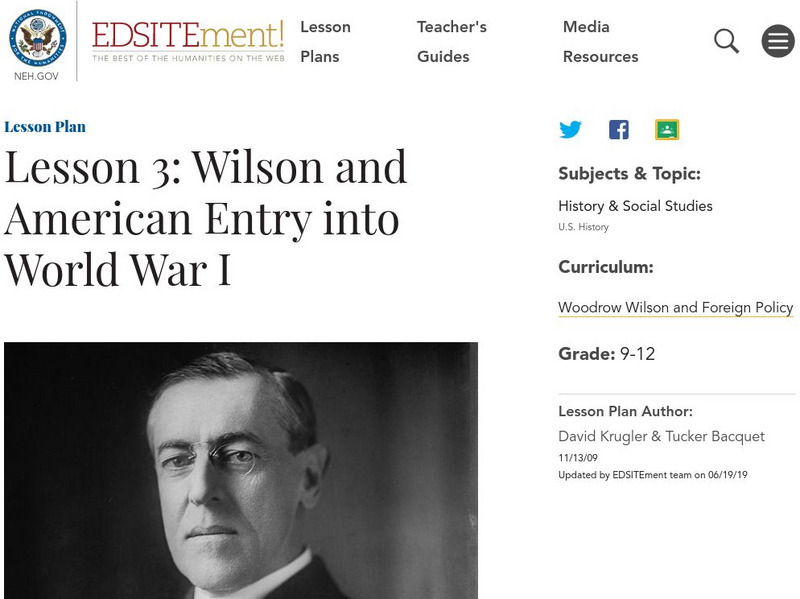Hi, what do you want to do?
Curated OER
Mapping and Personifying Nations
Eleventh graders analyze the geography, actions, and relationships of countries involved in World War II. They create a map of Europe, Northern Africa, and the Pacific, and analyze and evaluate their self-made map of Europe and the...
Curated OER
WW II Names and Faces
In this social studies worksheet, learners find the terms that are related to the people and events of World War II. The answers are found at the bottom of the page.
Curated OER
U.S. Entry Into WWI
Students identify the reasons why the United States entered World War I. In this world history instructional activity, students are given a lecture on Woodrow Wilson and analyze documents (specifically, Woodrow Wilson's speeches)....
Curated OER
The Munich Conference
In this World War II worksheet, students read a 1-page selection about the Munich Conference, examine a chart about the Axis and Allied powers, and then respond to 3 short answer questions about the information presented.
Curated OER
Propaganda
Learners discuss wartime propaganda after viewing the World War II film "Christmas Under Fire." They answer discussion questions, identify passages of propaganda from a transcript of the film, and write a brief from the Ministry of...
City University of New York
The Split Over Suffrage
Compare and contrast Frederick Douglass's and the National Women's Suffrage Association's stances on equal rights and suffrage with a series of documents and worksheets. Learners work together or independently to complete the packet, and...
Curated OER
D-day Message from General Eisenhower to General Marshall
Students analyze a "top secret" document written by Eisenhower. They identify and chart cliches for those about to go into battle and read related poetry. They invite a veteran to describe the D-Day invasion.
Curated OER
United States Entry into WWI: Two Diametrically Opposed Views
Students reconsider the events leading to US entry into WWI through the lens of archival documents.
Curated OER
Soviet Suspicions and the Search of Security
In this Cold War instructional activity, students read a 1-page selection about Soviet security and then respond to 3 short answer questions.
Curated OER
Lesson 4: Fighting for Peace: The Fate of Wilson's Fourteen Points
Students analyze foreign policy. In this Fourteen Points lesson, students examine Wilson's Fourteen Points, explore Allied reaction to the Points, and compare Wilson's foreign policy to the Versailles Treaty.
Curated OER
Lesson 7. The "Failed Peace"
Students investigate how policies and tactics utilized by the Allies to mobilize national unity and raise patriotism made it more difficult to achieve a humane peace after the war.
Curated OER
US Government: Foreign Policy
Students explore the basic precepts of American foreign policy. For this diplomacy lesson, students read textbook chapters regarding American foreign policy practices before and after World War II. Students also watch a...
Curated OER
Lesson 2. Symbols of the Stalemate
Eleventh graders identify and analyze the factors that led to WWI's stalemate. They examine The Schliefflen plan and analyze and rectify its strategic flaws.
Curated OER
The Great Gatsby - Study Help
In this literature activity, students respond to 8 short answer and essay questions about Fitzgerald's The Great Gatsby. Students may also link to an online interactive quiz on the novel at the bottom of the page.
Curated OER
Franklin D. Roosevelt
In this presidential history worksheet, learners respond to 9 essay and short answer questions about the presidency of Franklin D. Roosevelt.
Curated OER
Reconstruction Word Search Puzzle
In this social studies activity, students look for the words in the puzzle that are related to the theme of the word search. Spelling skills are worked on.
Curated OER
Mechanics Help Using the Comma with Formal Letters
In this worksheet, students analyze different parts of a letter and insert the appropriate punctuation including a comma, period, colon, question mark and semicolon.
Curated OER
Armistice Day
In this Armistice Day worksheet, students complete activities such as reading a passage, phrase matching, fill in the blanks, correct words, multiple choice, spelling, sequencing, scrambled sentences, writing questions, survey, and...
History of American Wars
History of American Wars: World War I Guns
The guns used by the Allies and Central Powers are presented in this resource. Recognize the artillery, machine guns, and rifles used by the militaries involved in World War I.
Digital Public Library of America
Dpla: Treaty of Versailles and the End of World War I
The sources in this primary set document the Treaty of Versailles and the end of World War I. Includes teaching guide.
Library of Congress
Loc: A Guide to World War I Materials
A web guide of links to World War I resources throughout the Library of Congress web site and beyond.
US National Archives
Nara: Military Resources World War I
A compilation of resources on World War I from the National Archives and Records Administration, including links to external sites.
First World War
First World war.com
Site does a good job of giving an overview of most of the key aspects of World War I: the causes of the war, a timeline, weapons of war, etc. As a special feature you can listen to vintage audio of speeches and music of the WWI era.
National Endowment for the Humanities
Neh: Edsit Ement: Woodrow Wilson and American Entry Into Ww I
This lesson plan explores the ways President Woodrow Wilson tried to keep America out of war as World War I raged in Europe. Examine documents, speeches, and other primary sources to follow America's path from neutrality to war.



























